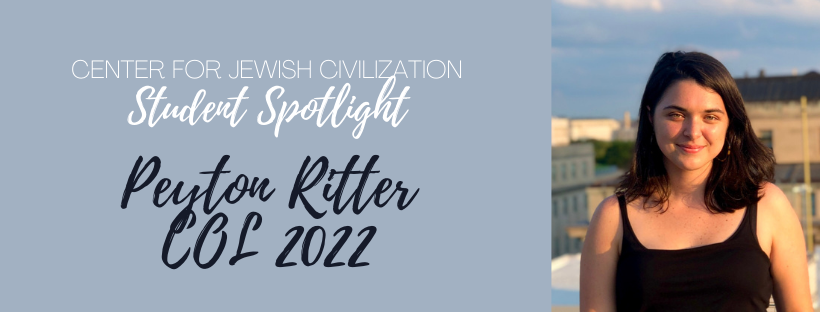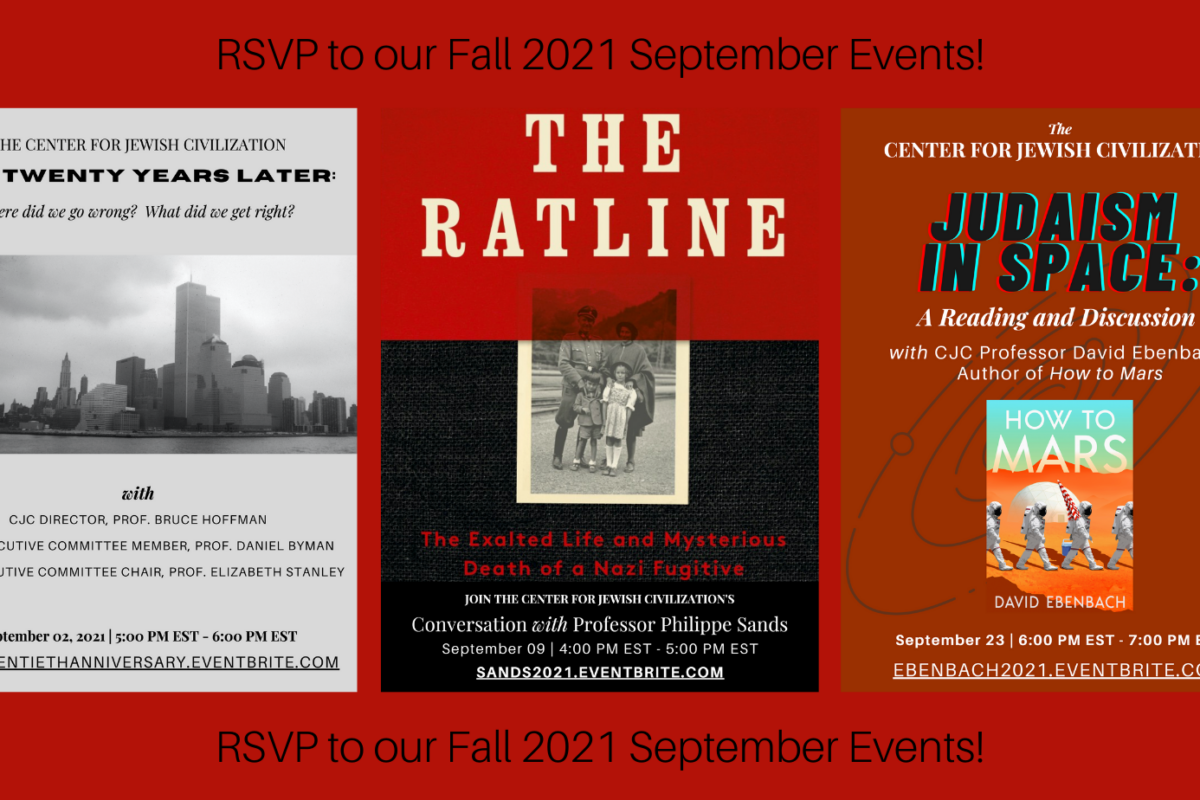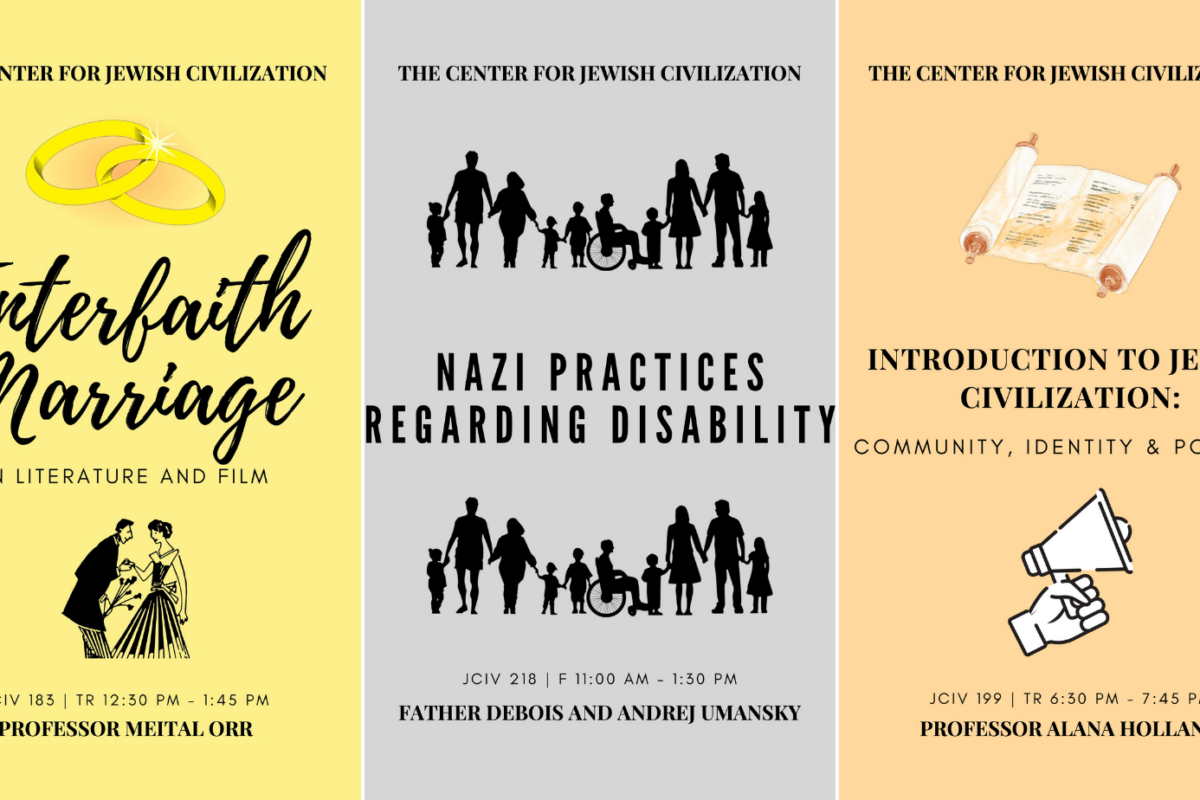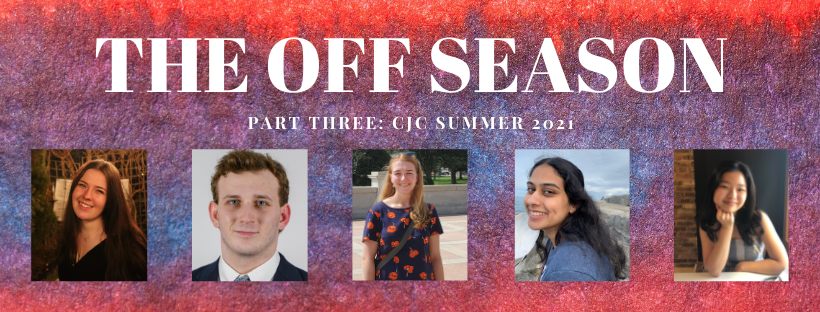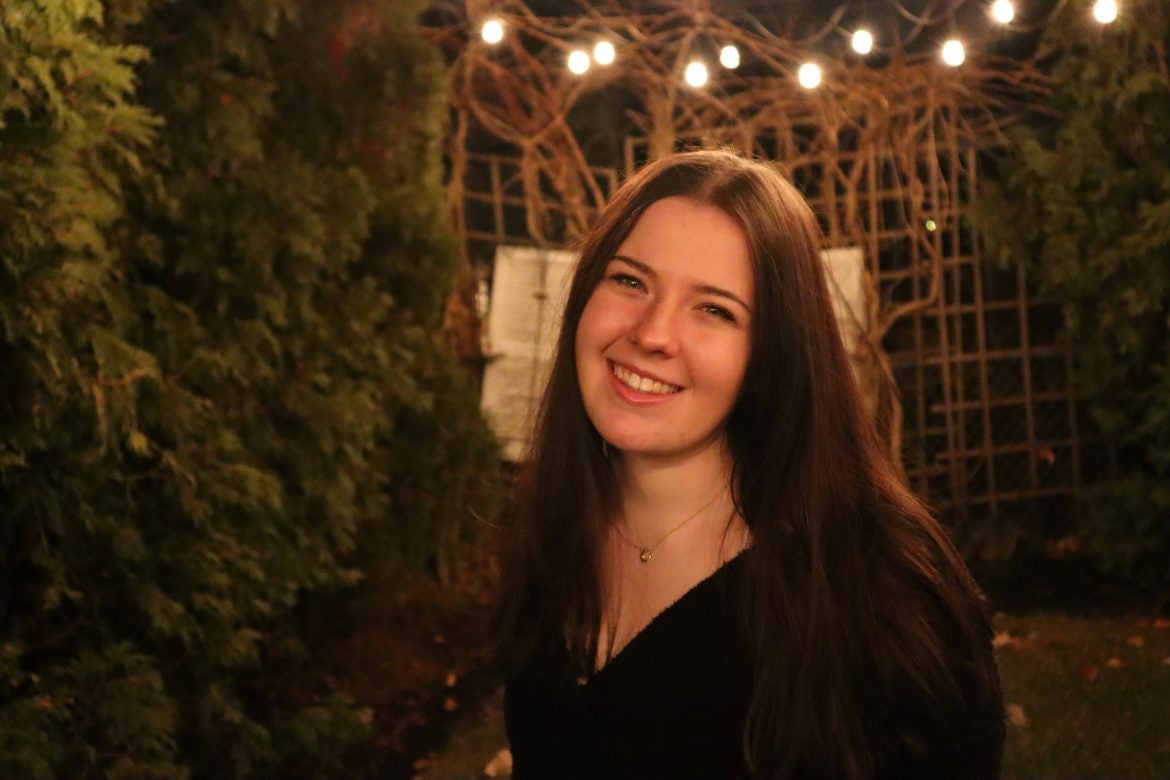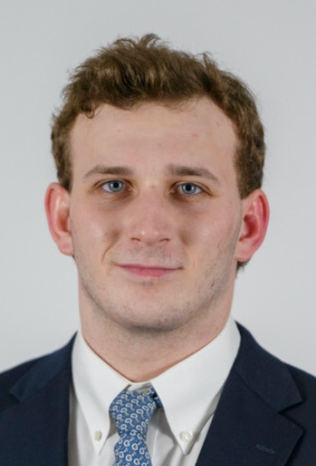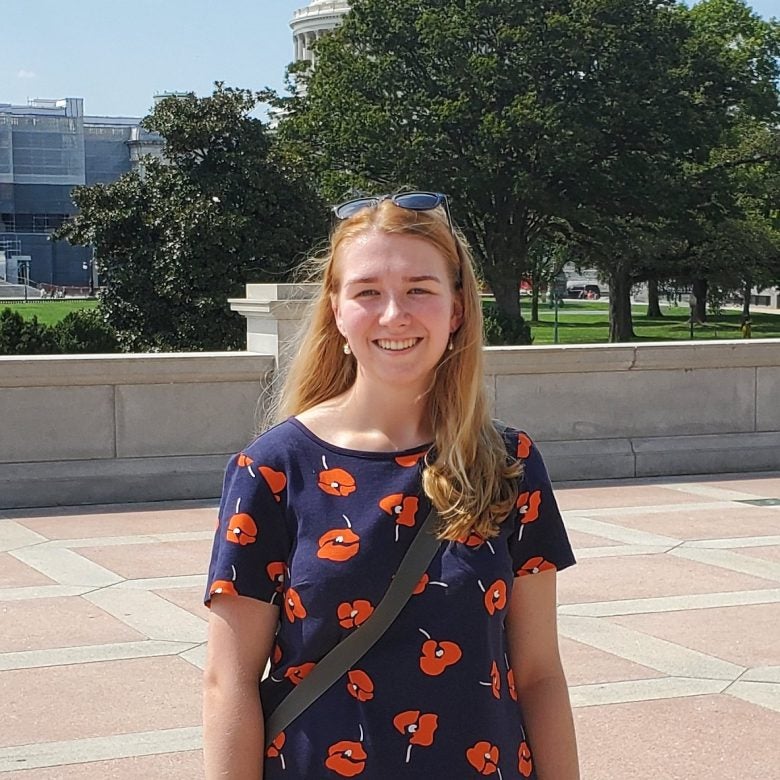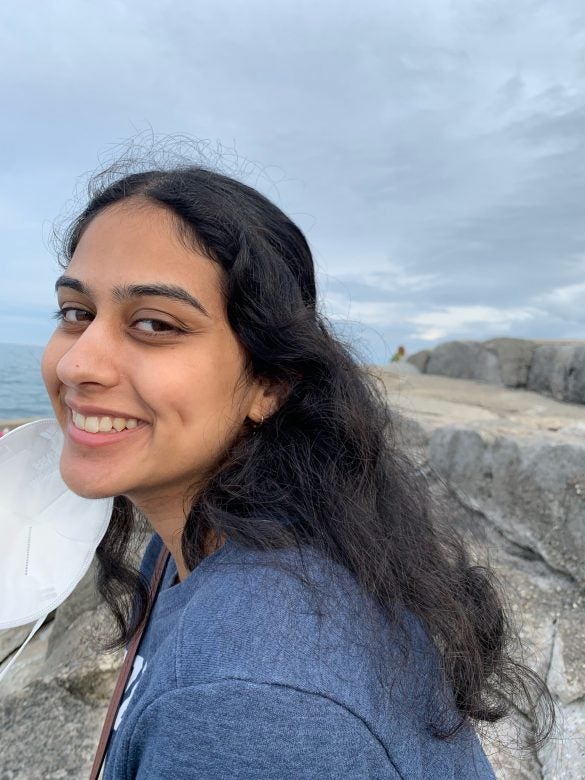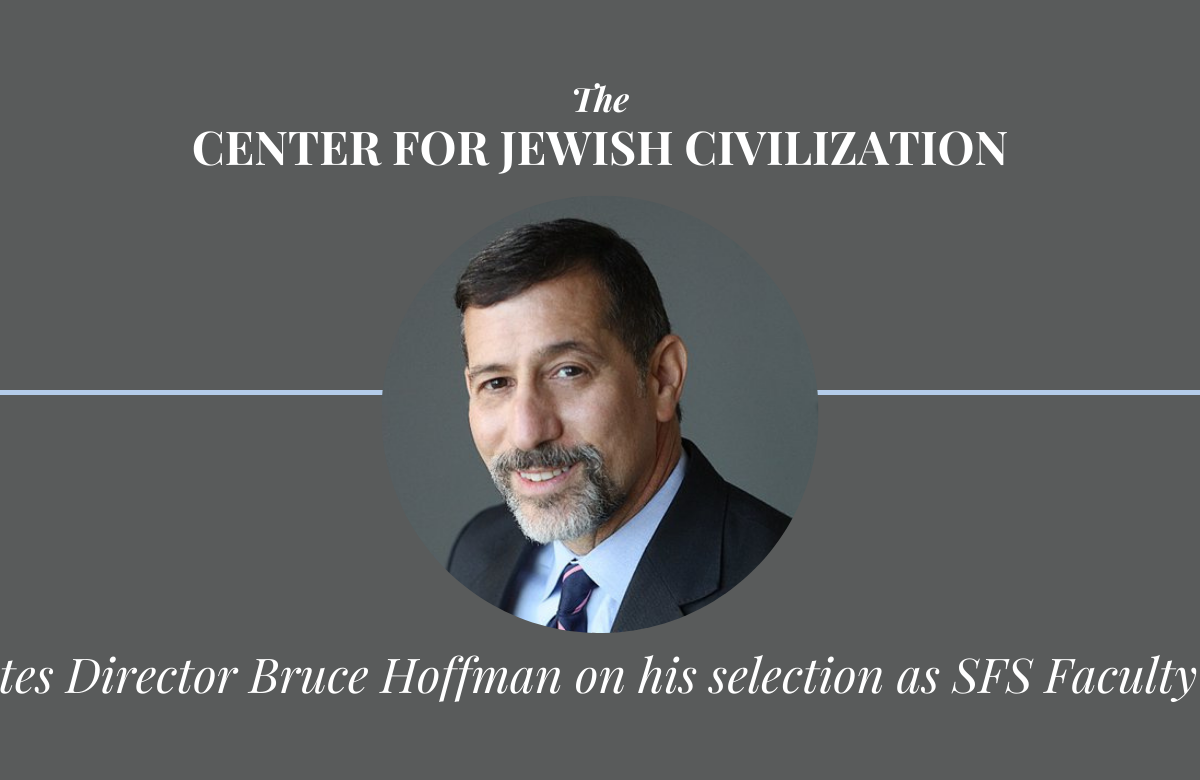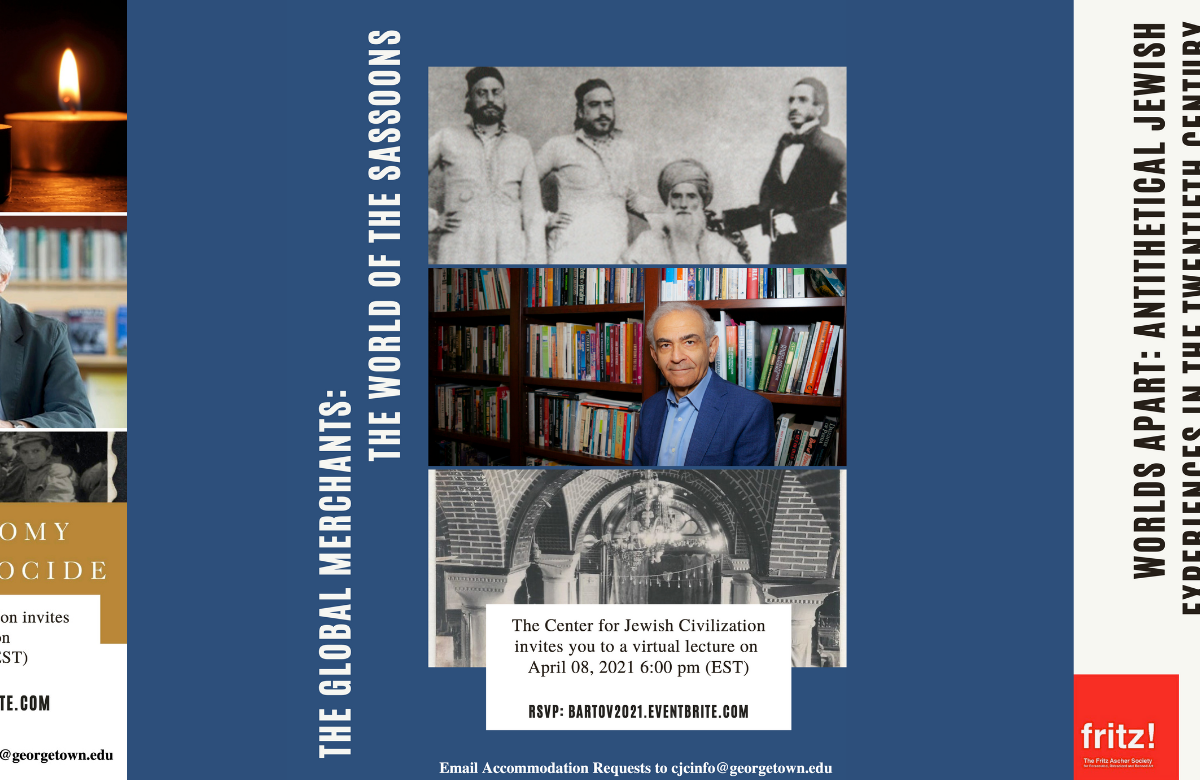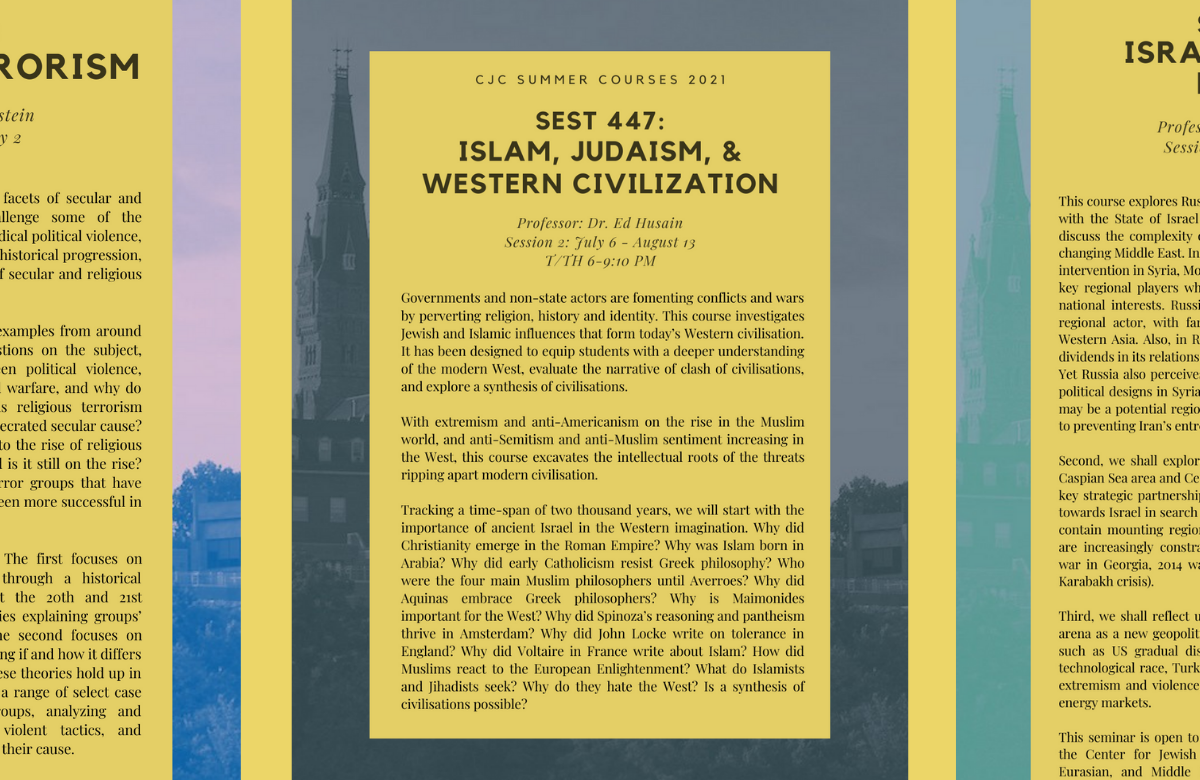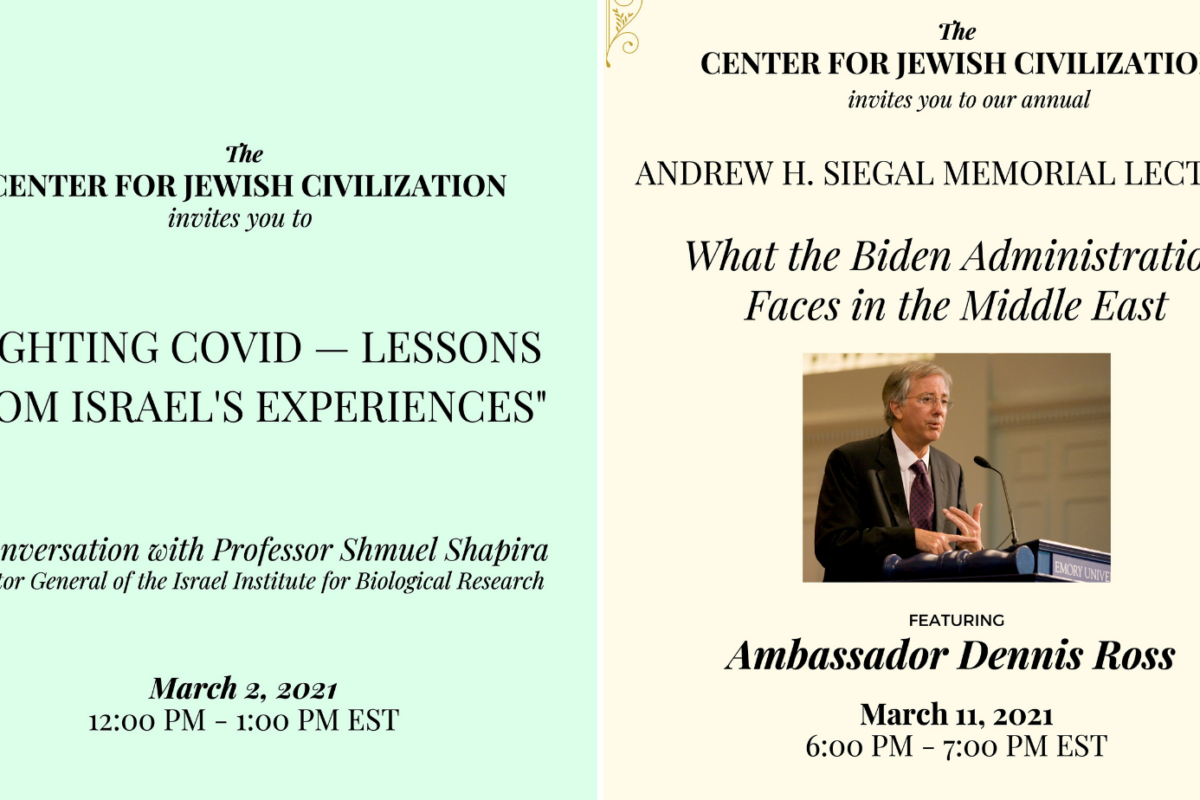CJC Student Spotlight: Peyton Ritter (COL ’22)
Welcome to the latest installment of the CJC Student Spotlight Series! This month we spotlight Peyton Ritter, a senior in the College from Lexington, Virginia. Ritter majors in Government and transferred to Georgetown from Occidental College during the Fall 2020 semester. Read about her unique journey to Georgetown and learn more about her CJC experience below!
Q: Tell us about yourself, Peyton!
A: Hi, friends of the CJC! I grew up in Lexington, Virginia, and have three older siblings. Before coming to Georgetown, I lived in Los Angeles, California, where I went rock climbing and trail running a lot. Sadly, I can’t really do that anymore in D.C, but I’m my happiest when strolling around the monuments at sunrise or at night. I also play the oboe and love orchestra music.
Q: How were you introduced to the CJC?
A: I took my first CJC class in the Spring of 2021. Halfway through that semester, I was convinced that I should join the Center after just a few conversations with students and faculty about the minor, its academic opportunities and wonderful people.
Q: Could you speak about your journey to Georgetown? Specifically, what school did you transfer to GU from? Could you speak a little bit about your experience as a transfer student? Lastly, what have you learned from the experience and what were some of the communities or groups that eased your transition?
A: I transferred from Occidental College, a small liberal arts school in Los Angeles. After two years there, I needed a change. I was thrilled to be accepted to Georgetown as an incoming junior for the Fall of 2020, but I was hesitant to transfer in an online setting during the pandemic (not an ideal situation). I gave it a shot anyway, and by the end of my first semester, it was clear that making the switch was one of the best decisions I had ever made. Even in an online environment, I felt welcomed and supported by other students, and was especially lucky to be taught by professors who were empathetic and understanding about the whole situation.
The transfer process, like any major life change, can be daunting. But I learned that it’s well worth the work and emotional energy when you land in the place you truly belong. That is such a wonderful feeling, and it’s how I feel at Georgetown.
Undoubtedly, the CJC has been the group that eased my transition most. Having transferred from a small school, the Center immediately provided me with a tight-knit community of students and faculty that I didn’t necessarily expect to find at a larger university. Also, I have to give a shout out to Father Matthew Carnes, my Fall 2020 Comparative Political Systems (CPS) professor. Father Carnes created a small discussion class the following semester so that CPS students could maintain our friendships throughout the entire school year. This is just one example of a professor who went out of their way to build a sense of community among students during such a challenging time, and certainly eased my transition to Georgetown.
Q: What was your first CJC class? Have you had any favorite courses thus far?
A: My first (and favorite) CJC class was Professor Jacob Ware’s course, “The Weaponization of Hate.” Professor Ed Husain’s “Islam, Judaism, and Western Civilization” was also amazing.
Q: What are some of your academic interests? How have you explored them while at the Center?
A: I first became interested in security studies after the January 6th insurrection attempt at the U.S. Capitol. Two weeks later, on January 15th, the CJC hosted Professor Bruce Hoffman and Professor Elizabeth Stanley for a virtual discussion on the attack. I only left wanting to know more. After the event ended, I scrolled through course listings and found “The Weaponization of Hate” – an introductory course on domestic far-right extremism in the COVID-19 era. I immediately contacted my academic dean for a course overload and enrolled a few days later. Then the class basically changed my life. I really owe it to the CJC– they not only pulled together such an interesting and timely speaking event (over winter break!), but also designed an entire course for students to learn about the ideological trends and threats that culminated in the January 6th attack and other incidences of far-right terrorism.
This past summer, I took two more CJC classes: Alon Burstein’s “Religious Terrorism” and Professor Ed Husain’s “Islam, Judaism, and Western Civilization,” both of which broadened my knowledge about terrorism beyond the context of the far-right. I am really looking forward to putting my knowledge from each of these classes toward my senior thesis, which will examine how neo-Nazis have responded to the War on Terror.
Q: How has the CJC impacted your time at Georgetown?
A: It has made it so much better. If I have a problem, need career advice or interview prep, or just want to talk about my feelings or rant about something, the CJC is where I know to go. I’m really thankful for that, especially as a transfer student navigating a new space.
Q: What have been some of your favorite moments while a GU student in general? Have there been any highlights of your time thus far?
A: Georgetown can be an amazing place for students interested in politics. I’ll never forget being able to talk one-on-one with former Alabama Senator Doug Jones, a Spring 2021 GU Politics fellow, for nearly an hour last semester. He gave me pretty solid life advice. So, to other students, I highly recommend getting involved in GU Politics – the lineup of fellows is remarkable every semester, and they’re here to talk to you about anything, from your career aspirations to the latest news headlines.
Q: What are you most looking forward to this upcoming semester?
A: I’m mainly just happy to be back in-person: to study on campus, spend much-needed time with friends after over a year of virtual classes, and of course hang out and watch the news (or Love Island) in the CJC lounge. And, as anyone who knows me will attest, I’m really excited to be taking Professor Bruce Hoffman’s “Terrorism: Middle East & North Africa” class and Professor Dan Byman’s “Hate Groups and Social Media” class. I will be nerding out all semester.
Thank you for sharing with us, Peyton. Look out for our next student spotlight in October!
RSVP to our Fall 2021 Events!
Have you RSVP’d for our September Fall 2021 events? This month, the Center for Jewish Civilization is pleased to host Professors Dan Byman, David Ebenbach, Bruce Hoffman, Philippe Sands and Elizabeth Stanley. Find out more about our events and RSVP below.
“Discussion of the Twentieth Anniversary of the September 11 Attacks”
Thursday, September 2, 5:00 PM EST
About the Event:
The CJC invites you to our event on the twentieth anniversary of the September 11 attacks. RSVP to our panel here! Our virtual lecture event will be accessible to all viewers via Zoom. Zoom invitations will be emailed to all those who RSVP.
In light of the twentieth anniversary of 9/11, our panelists will convene to discuss where the U.S went wrong, what it did right, and how the world was affected. Please join leading terrorism experts, Professor Daniel Byman and CJC Director Bruce Hoffman, in discussion with the CJC’s Executive Committee Chair, Professor Elizabeth Stanley, as they examine the legacy and continuing repercussions of the September 11 attacks. In addition to their renown as scholars of terrorism and counterterrorism, both Professors Byman and Hoffman were across from the Pentagon when American Airlines flight crashed into it that fateful morning and thus bring a unique first-hand perspective to a subject that they have both spent their careers analyzing.
About the Speakers:
CJC Director, Professor Bruce Hoffman presently serves as Director of the Center for Jewish Civilization. He has been studying terrorism and insurgency for over four decades. He is a tenured professor in Georgetown University’s Walsh School of Foreign Service and until recently was director of its Center for Security Studies and Security Studies Program. Hoffman is also visiting Professor of Terrorism Studies at St Andrews University, Scotland. He previously held the Corporate Chair in Counterterrorism and Counterinsurgency at the RAND Corporation, where he was also director of RAND’s Washington Office and vice president for external affairs. Hoffman was appointed by the U.S. Congress as a commissioner on the 9/11 Review Commission and has been Scholar-in-Residence for Counterterrorism at the Central Intelligence Agency; adviser on counterterrorism to the Coalition Provisional Authority, Baghdad, Iraq; and, an adviser on counterinsurgency to Multi-National Forces-Iraq Headquarters, Baghdad, Iraq. Hoffman’s most recent books include The Evolution of the Global Terrorist Threat (2014); Anonymous Soldiers (2015); and, Inside Terrorism (3rd edition, 2017). Hoffman is currently a Wilson Center Global Fellow, a visiting senior fellow at the Council on Foreign Relations and a senior fellow at the U.S. Military Academy’s Combating Terrorism Center.
CJC Executive Committee Member, Professor Daniel Byman is a professor in the School of Foreign Service with a concurrent appointment with the Department of Government. He served as Vice Dean of the SFS undergraduate program from 2015 until 2020 and before that as director of Georgetown’s Security Studies Program and Center for Security Studies from 2005 until 2010. He also leads at Georgetown team in teaching a “Massive Open Online Course” (MOOC) on terrorism and counterterrorism for EdX. Professor Byman is also a part-time Senior Fellow at the Center for Middle East Policy at the Brookings Institution. From 2002 to 2004 he served as a Professional Staff Member with the 9/11 Commission and with the Joint 9/11 Inquiry Staff of the House and Senate Intelligence Committees. Before joining the Inquiry Staff he was the Research Director of the Center for Middle East Public Policy at the RAND Corporation. Previous to this, Professor Byman worked as an analyst on the Middle East for the U.S. government. He is the author of Road Warriors: Foreign Fighters in the Armies of Jihad (Oxford, 2019); Al Qaeda, the Islamic State, and the Global Jihadist Movement: What Everyone Needs to Know (Oxford, 2015); A High Price: The Triumphs and Failures of Israeli Counterterrorism (Oxford, 2011); The Five Front War: The Better Way to Fight Global Jihad (Wiley, 2007); Deadly Connections: States that Sponsor Terrorism (Cambridge, 2005); Keeping the Peace: Lasting Solutions to Ethnic Conflict (Johns Hopkins, 2002); and co-author of Things Fall Apart: Containing the Spillover from the Iraqi Civil War (Brookings, 2007) and The Dynamics of Coercion: American Foreign Policy and the Limits of Military Might (Cambridge, 2002). Professor Byman has also written extensively on a range of topics related to terrorism, international security, civil and ethnic conflict, and the Middle East. His recent articles have appeared in Foreign Affairs and Foreign Policy, as well as journals including Political Science Quarterly, Studies in Conflict and Terrorism, International Security, and Journal of Strategic Studies.
CJC Executive Committee Chair, Professor Elizabeth Stanley is an Associate Professor of Security Studies at Georgetown University. Previously, she served as Associate Director of Georgetown’s Security Studies Program. Professor Stanley served as a U.S. Army intelligence officer in South Korea, Germany and on Balkans deployments, leaving service as a captain. She created Mindfulness-based Mind Fitness Training (MMFT)®, and has taught MMFT to thousands in civilian and military high-stress environments. Additionally, she is a certified practitioner of the body-based trauma therapy, Somatic Experiencing. Her book, Paths to Peace, won the 2009 Edgar S. Furniss Award for its “exceptional contribution to the field of national security.” She received her B.A. in Soviet and East European Studies from Yale University. She holds a Ph.D. in Government from Harvard University and an M.B.A. in technology strategy and organizational behavior from MIT’s Sloan School of Management. Her latest book is titled Widen the Window: Training Your Brain and Body to Thrive During Stress and Recover from Trauma.
“The Ratline: The Exalted Life and Mysterious Death of a Nazi Fugitive”
Thursday, September 09, 4:00 PM EST
About the Event:
The CJC invites you to our book discussion with Professor Philippe Sands about his latest book, ‘The Ratline: The Exalted Life and Mysterious Death of a Nazi Fugitive.” RSVP to our event here! Our virtual lecture event will be accessible to all viewers via Zoom. Zoom invitations will be emailed to all those who RSVP.
From Penguin Random House :
From the author of the internationally acclaimed, award-winning East West Street: A tale of Nazi lives, mass murder, love, cold war espionage, a mysterious death in the Vatican–and “the Ratline,” the Nazi escape route to Peron’s Argentina.
Baron Otto von Wächter, Austrian lawyer, husband, father, high Nazi official, senior SS officer, former governor of Galicia during the war, creator and overseer of the Krakow ghetto, indicted after as a war criminal for the mass murder of more than 100,000 Poles, hunted by the Soviets, the Americans, the British, by Simon Wiesenthal, on the run for three years, from 1945 to 1948.
Philippe Sands pieces together, in riveting detail, Wächter’s extraordinary, shocking story. Given full access to the Wächter family archives–journals, diaries, tapes, and more–and with the assistance of the Wächters’ son Horst, who believes his father to have been a “good man,” Sands writes of Wächter’s rise through the Nazi high command, his “blissful” marriage and family life as their world was brought to ruin, and his four-year flight to escape justice–to the Tirol, to Rome, and the Vatican; given a new identity, on his way to a new life via “the Ratline” to Perón’s Argentina, the escape route taken by Eichmann, Mengele, and thousands of other Nazis. Wächter’s escape was cut short by his mysterious, shocking death in Rome, in the midst of the burgeoning Cold War (was he being recruited in postwar Italy by the Americans and the U.S. Army Counter Intelligence Corps or by the Soviet NKVD or by both; or was he poisoned by one side or the other, as his son believes–or by both?) . . .
An extraordinary discovery, told up-close through access to a trove of family correspondence between Wächter and his wife–part historical detective story, part love story, part family memoir, part Cold War espionage thriller.
About the Speaker:
Philippe Sands is a Professor of Law, Director of the Centre on International Courts and Tribunals, and a key member of staff in the Centre for Law and the Environment at University College London. His teaching areas include public international law, the settlement of international disputes (including arbitration), and environmental and natural resources law.
Philippe is a regular commentator on the BBC and CNN and writes frequently for leading newspapers. He is frequently invited to lecture around the world, and in recent years has been a Visiting Professor at the University of Toronto (2005), the University of Melbourne (2005) and the Universite de Paris I (Sorbonne) (2006, 2007). He has previously held academic positions at the University of London’s School of Oriental and African Studies, Kings College London and , University of Cambridge and was a Global Professor of Law at New York University from 1995-2003. Sands was co-founder of FIELD (Foundation for International Environmental Law and Development), and established the programs on Climate Change and Sustainable Development. He is a member of the Advisory Boards of the European Journal of International Law and Review of European Community and International Environmental Law (Blackwell Press). In 2007 he served as a judge for the Guardian First Book Prize award.
As a practicing barrister, Professor Sands has extensive experience litigating cases before the International Court of Justice, the International Tribunal for the Law of the Sea, the International Center for the Settlement of Investment Disputes, and the European Court of Justice. He frequently advises governments, international organizations, NGOs and the private sector on aspects of international law. In 2003 he was appointed a Queen’s Counsel. He has been appointed to lists of arbitrators maintained by ICSID and the PCA.
“Judaism in Space: A Reading and Discussion”
Thursday, September 23, 6:00 PM EST
About the Event:
The CJC invites you to our reading and discussion with Professor David Ebenbach about his latest book, ‘How to Mars.’ RSVP to our event here! Our virtual lecture will be accessible to all viewers via Zoom. Zoom invitations will be emailed to all those who RSVP.
How to Mars is an exploration of a somewhat absurd effort to colonize the red planet, and has been called “A poignant examination of what it means to be human” (Kirkus Reviews). The CJC’s Professor Ebenbach will also discuss a question that arose in writing the novel: given how tied Judaism is to the time cycles and places of Earth, how could it survive on other planets?
About the Speaker:
David Ebenbach is the author of seven books of fiction, poetry, and non-fiction, winners of numerous awards, including the Drue Heinz Literature Prize, the Juniper Prize, and the Orison Fiction Prize. He teaches creative writing and literature in the Center for Jewish Civilization and is a Project Manager at Georgetown’s teaching center, the Center for New Designs in Learning and Scholarship.
View Our Fall 2021 Course Lineup!
The Center for Jewish Civilization is pleased to announce its lineup of Fall 2021 courses!
Holocaust Courses
- “3rd Generation Biographies of Nazis and their Victims” (One-Credit), Prof. Suzanne Brown-Fleming, JCIV-026
- “Theological Implications of the Holocaust,” Prof. Ori Soltes, JCIV-138
- “Nazi Policies and Practices Regarding Disability,” Father Patrick Desbois & Andrej Umansky, JCIV-218
- “Holocaust by Bullets,” Father Patrick Desbois & Andrej Umansky, JCIV-276
International Affairs and Diplomacy Courses
- “Israel and International Human Rights” (One-Credit), Amb. Zion Evrony, JCIV-022
- “History of Antisemitism,” Prof.Jonathan Ray, JCIV-103
- “Protocols of the Elders of Zion, Digital Edition: Propaganda, Conspiracy, and the Politics of Hate,” Prof. Emily Blout, JCIV-181
- “Congress and Making Middle East Foreign Policy,” Danielle Pletka, JCIV-235
- “The Arab Spring and Israel,” Moran Stern, JCIV-245
- “History of Peacemaking in the Middle East,” Amb. Dennis Ross, JCIV-321
- “Terrorism: Middle East and North Africa,” Dir. Bruce Hoffman, JCIV-341
Humanities, Culture & Jewish Studies Courses
- “Poetry Writing Workshop,” Prof. David Ebenbach, JCIV-144
- “Interfaith Marriage in Literature and Film,” Prof. Meital Orr, JCIV-183
- “Jerusalem: City and Symbol,” Prof. Ori Soltes, JCIV-187
- “Jews on Trial,” Prof. Ori Soltes, JCIV-225
- “Sex, Tattoos and Death Panels? Jewish Views on Contemporary Issues” (One-Credit), Rabbi Rachel Gartner, JCIV-018
Required Certificate / Minor Courses
The Off Season: 2021 CJC Student Summers
Welcome to the third installment of the Center for Jewish Civilization’s “Off Season” series! Every year, CJC staff and faculty offer guidance on securing student internship, research, fellowship and job positions. Our spotlights represent the breadth of interests and skills at the Center. Read below to find out what some of our students have been up to this summer!
Isabelle Greenberg
Isabelle Greenberg is a rising sophomore in the School of Foreign Service from Libertyville, Illinois. She will major in International Politics with a concentration in Security Studies. Additionally, she will minor in both Arabic and Jewish Civilization. This summer, Greenberg is taking classes with Professors Alon Burstein and Ed Husain on Religious Terrorism and Islam, Judaism, and Western Civilization. She also plays in her local county symphony as a cellist. She works with Professor Sarah-Masha Fainberg as a research and teaching assistant for her “Israel, Russia, and Eurasia” course. The two are in the process of writing a piece on energy security in the Middle East. They are also creating a proposal for the establishment of a Tel Aviv branch of Radio Free Europe/Radio Liberty’s Current Time TV media outlet.
Noah Klein
Noah Klein is a rising junior in the McDonough School of Business from Baltimore, Maryland. In addition to pursuing a minor in Jewish Civilization, Klein majors in Finance. This summer, he interns at both HighCape Capital and Brown Advisory. HighCape Capital is a late-stage venture capital firm located in New York City focusing on the life science industry. Klein generates reports on revenue growth, business models, and product offerings. He also constructs reports on other key financial data for a handful of proteomic companies that HighCape will analyze when establishing an exit strategy for their merger with an early developmental stage proteomic company called Quantum-Si. Brown Advisory is an investment advisory firm based out of Baltimore. The firm has roughly $64 billion in assets under management. Klein’s time at Brown will be spent shadowing and working under different analysts while learning more about a variety of investment services in different market sectors. When he is not working, he is enjoying his summer vacation in Camden, Maine.
Paige Plucker
Paige Plucker is a rising junior in the College majoring in Theology with a concentration in Religious Studies. She minors in Jewish Civilization and is originally from Memphis, Tennessee. This summer, she has the privilege of participating in Brandeis University’s Gilda Slifka internship. For over twenty years, the internship has awarded selected students with research interests in issues pertaining to Jewish women or Jewish gender issues the opportunity to participate in the Institute’s paid residential internship program. Plucker developed her interest in Orthodox communities as a student in Professor Jessica Roda’s course on Jewish Orthodox Women in North America. Her research is focused on the intersection of Judaism and gender. Under her mentor, Dr. Debra Kaufman, she researches Orthodox women and is completing an independent project on the Orthodox Jewish community in her hometown.
Ria Pradhan
Ria Pradhan is a rising junior in the School of Foreign Service from the San Francisco Bay Area. She is majoring in International Political Economy. This summer, she will intern at the U.S. Department of State’s Bureau of South and Central Asian Affairs. She will also continue her role as a research assistant with Professor Jacques Berlinerblau. At her internship, she hopes to learn more about the role of foreign policy in protecting marginalized communities in the region. With Professor Berlinerblau, she works on a variety of projects through which she is expanding her knowledge on diverse topics. Among other issues, these topics include secularism, literature, and the Me Too movement.
–––
Thank you for sharing, CJCers! For more updates on our students and programming this summer, be sure to regularly visit our website, follow us on Twitter, and on Instagram.
CJC Student Spotlight: Maddox Angerhofer (SFS ’22)
Welcome to the latest installment of the CJC Student Spotlight Series! This month we spotlight Maddox Angerhofer, a junior in the School of Foreign Service from New Hampshire. Angerhofer majors in International Politics, with a concentration in security. In addition to Jewish Civilization, she minors in Persian. Read her responses below to learn more about her time at the CJC!
Q: Briefly tell us about yourself, Maddox!
A: Outside of being an SFS student, I work with the Georgetown Language Project as a Spanish Translation Head, volunteering translation services to non-profits and government agencies in and around D.C. I also compete with the lightweight women’s rowing team. As an avid hiker, I am working my way toward hiking all 500 miles of trail in nearby Shenandoah National Park.
Q: How were you introduced to the CJC?
A: Contrary to popular belief, you do not have to take Professor Berlinerblau’s proseminar to join the CJC! I was introduced to the wonderful people of the Center during New Student Orientation, when I attended an open house. I was impressed by the CJC’s ambitious goals for its students and its caring community, so I applied to join the certificate program that fall.
Q: What was your first CJC class? Have you had a favorite one thus far?
A: My first CJC class was “Intro to Jewish Civilization” with Moran Stern, whom I have gone on to assist in his research. I would also have to say this was my favorite CJC class so far. Because students join the Center at different times throughout their degree program, I had classmates ranging from freshmen to seniors. I enjoyed getting to know students I wouldn’t have otherwise met, and learning about the relationship between the history of Judaism and politics.
Q: What are some of your academic interests? Have you further explored them while a CJC Minor?
A: My primary academic interest is Iran’s foreign policy, especially its relations with Israel. To this end, I am minoring in Persian. Studying in both the CJC and the Persian Program has given me a look at both sides of the contentious relationship between Israel and Iran. In Professor Jessica Roda’s class, “Muslims and Jews”, I studied the religious interactions of Judaism and Islam in Iran. It was fascinating to learn about the second largest Jewish population in the Middle East, including the language of Judeo-Persian, a variant of Persian written in the Hebrew alphabet.
Q: How has the CJC impacted your time at Georgetown?
A: Joining the CJC immediately gave me access to a fantastic group of people –– faculty and students alike –– who have supported every aspect of my time at Georgetown. From baked goods (thank you, Jocelyn) to career advice, the CJC has just about everything you need. Sophomore year, I even roomed with a co-CJCer! Academically, the Center has given me access to coursework that is more regionally focused than my major, allowing me to apply theory I’ve learned in other international politics classes to coursework about Israel and its neighbors.
Q: What have you been up to during the pandemic? Have you managed to continue exploring your research interests?
A: During the summer of 2020, I received a Foreign Language and Area Studies Fellowship to take an intensive Persian course. My final project for the class was a seven-page research paper written in Persian on Iranian-Israeli relations under the Shah. During the 2020-2021 school year, I chose to take a leave of absence from Georgetown and move to the Alaskan bush! I spent the year living 150 miles away from the nearest grocery store training sled dogs to race in the Iditarod, a thousand-mile sled dog race that takes place every March. The team I helped train came in third place out of 46 entrants. Due to connectivity constraints, I had to pause most of my Georgetown-related activities, but I spent the time on the back of the dogsled ruminating about my JCIV senior thesis.
Q: Can you tell us a bit about your time doing research for our faculty?
A: After taking “Intro to Jewish Civilization” with Professor Stern during my freshman year, I started working with him as a research assistant. His research focuses on the development of factions in Palestinian political groups. What I’ve enjoyed most about helping with Professor Stern’s work has been seeing his research progress from the early stages to nearing publication. Working with him has given me great experience conducting quantitative social science research. In assisting with the text analysis portion of the research, I helped collect quotations from important figures in Palestinian politics, parse recurring themes and topics from the quotations, and then uncover broader trends across the data set. Coming to Georgetown, I didn’t expect to have the opportunity to begin work as a research assistant at the end of my first year, but the faculty at the CJC are incredibly accessible to their undergraduate students. I am looking forward to continuing to assist Professor Stern now that I am back from the Alaskan wilderness!
Q: How have you furthered your learning experience outside of the CJC?
A: One of my favorite parts of my academic experience has been attending guest lectures outside of my classes, whether it’s an on campus lecture in Gaston Hall or a presentation at a think tank downtown. Sophomore year, however, I had the opportunity to be on the other side of the podium! I took Professor Daniel Byman’s Centennial Lab on national security and social media. The goal of the lab was to produce original research. As part of a group of graduate and undergraduate students, I co-authored a paper about the user migration implications of deplatforming right-wing extremists from social media. After the course concluded, my group and I continued to refine our work at the direction of Professor Byman, and we were ultimately invited to present our research at an Army Futures Command conference in June of 2020. Getting feedback on our work from security professionals and leaders in the field was invaluable.
Q: What have been some of your favorite moments while an SFS student in general?
A: One of my most memorable moments as an SFS student was attending a lecture by Rabbi Abraham Skorka, a friend of Pope Francis who has co-authored a book with him. It was a very Georgetown moment, given the emphasis on inter-religious dialogue within the educational experience at Georgetown. After the lecture, I wanted to ask the Rabbi a question, but it was quite loud in the room and difficult to hear. Since Rabbi Skorka is Argentinian, we switched to Spanish to make things easier. I was a few months away from my Spanish proficiency exam; talking with Rabbi Skorka was great practice!
My second favorite moment would have to be a field trip I took to Gettysburg my sophomore fall. I took a one credit class on the strategy and technology used at the battle. The culminating class took place on the battlefield one Saturday morning, and getting a tour from Professor Thomas McNaugher, a West Point graduate, made the discussions we had in class so much more tangible.
Q: What are you most looking forward to this upcoming semester?
A: This coming semester, I am looking forward to moving back to D.C. and seeing all of my friends, colleagues, classmates, and professors in person!
CJC Dir. Bruce Hoffman Selected as SFS Faculty of the Year
RSVP to Our Final Spring 2021 Events!
Have you RSVP’d for our last three events of the Spring 2021 semester? The Center for Jewish Civilization is pleased to host Brown University’s Dr. Omer Bartov, Georgetown University’s Dr. Joseph Sassoon, and the CJC’s own Dr. Ori Soltes for our final lectures on April 8, 15, and 28. Find out more about our events and RSVP below.
Thursday, April 08, 2021, 6:00 PM EST
About this Event:
The CJC invites you to Dr. Omer Bartov’s lecture, “Genocide from Below: Rewriting the Holocaust as First-Person Local History.” RSVP required — you may do so here. Only those who register will receive the Zoom link to access the lecture.
For more than four hundred years, the Eastern European border town of Buczacz – today part of Ukraine – was home to a highly diverse citizenry. It was here that Poles, Ukrainians, and Jews all lived side by side in relative harmony. Then came World War II, and three years later the entire Jewish population had been murdered by German and Ukrainian police, while Ukrainian nationalists eradicated Polish residents. In this lecture, Dr. Omer Bartov will discuss his most recent works, including Anatomy of a Genocide: The Life and Death of a Town Called Buczacz (2018) and Voices on War and Genocide (2020), and how significant individual witnesses from one locality are to the writing of history, particularly of conflict and war. Using primarily diaries and personal letters from eyewitnesses in and around Buczacz – perpetrators, victims, and survivors – he will explain how genocide doesn’t occur as is so often portrayed in popular history, with the quick ascent of a vitriolic political leader and the unleashing of military might. It begins in seeming peace, slowly and often unnoticed, as the culmination of pent-up slights and grudges and indignities. The perpetrators aren’t only sociopathic soldiers. They are neighbors and friends and family. They are also middle-aged men who come from elsewhere, often with their wives and children and parents, and settle into a life of bourgeois comfort peppered with bouts of mass murder.
About the Speaker:
Born in Israel and educated at Tel Aviv University and St. Antony’s College, Oxford, Dr. Omer Bartov’s early research concerned the Nazi indoctrination of the Wehrmacht and the crimes it committed in World War II, analyzed in his books, The Eastern Front, 1941-1945, and Hitler’s Army. He then turned to the links between total war and genocide, discussed in his books Murder in Our Midst, Mirrors of Destruction, and Germany’s War and the Holocaust. Bartov’s interest in representation also led to his study, The “Jew” in Cinema, which examines the recycling of antisemitic stereotypes in film. His more recent work has focused on interethnic relations in the borderlands of Eastern Europe. His book Erased (2007) investigates the politics of memory in West Ukraine, while his most recent monograph, Anatomy of a Genocide: The Life and Death of a Town Called Buczacz (2018) is a microhistory of ethnic coexistence and violence. The book received the National Jewish Book Award and the Yad Vashem International Book Prize for Holocaust Research, among others, and has been translated into several languages. Bartov has just completed a new monograph, tentatively titled Tales from the Borderlands: Making and Unmaking the Past. His many edited volumes include Voices on War and Genocide: Three Accounts of the World Wars in a Galician Town (2020) and, reflecting his new interest, the forthcoming Israel/Palestine: Lands and Peoples.
Thursday, April 15, 2021, 6:00 PM EST
About the Event:
The CJC invites you to a lecture with Dr. Joseph Sassoon, the Director of the Center for Contemporary Arab Studies (CCAS). The influential merchants of the nineteenth and early twentieth centuries shaped globalization today. The Sassoons, a Baghdadi-Jewish trading family, built a global trading enterprise by taking advantage of major historical developments during the nineteenth century. Their story is not just one of an Arab Jewish family that settled in India, traded in China, and aspired to be British. It also presents an extraordinary vista into the world in which they lived and prospered economically, politically, and socially. The Global Merchants is not only about their rise, but also about their decline: why it happened, how political and economic changes after the First World War adversely affected them, and finally, how realizing their aspirations to reach the upper echelons of British society led to their disengagement from business and prevented them from adapting to the new economic and political world order. RSVP required. Only those who register will receive the Zoom link to access the lecture. RSVP here!
About the Speaker:
Dr. Joseph Sassoon is a Professor at the School of Foreign Service and History Department at Georgetown University and holds the al-Sabah Chair in Politics and Political Economy of the Arab World. He is also a Senior Associate Member at St Antony’s College, Oxford. In 2013, his book Saddam Hussein’s Ba‘th Party: Inside an Authoritarian Regime (Cambridge University Press, 2012) won the prestigious British-Kuwait Prize for the best book on the Middle East.
Sassoon completed his Ph.D at St Antony’s College, Oxford. He has published extensively on Iraq and its economy and on the Middle East. He is working currently on a book about the Global Merchants: The World of the Sassoons which will be published next year by Penguin in the UK and Knopf in the US.
Wednesday, April 28, 2021, 5:00 PM EST
The CJC invites you to our book discussion with Dr. Ori Z. Soltes, the former Director of the B’nai B’rith Klutznick National Jewish Museum. RSVP here! RSVP required. Only those who register will receive the Zoom link to access the lecture. This program will delve into the following books:
- Immortality, Memory, Creativity, and Survival: The Arts of Alice Lok Cahana, Ronnie Cahana, and Kitra Cahana
This book reviews the story of a 14-year-old girl from Sarvar, Hungary who was deported to Auschwitz by the Nazis, together with her family. She was the sole survivor of the deportation and transit through three different camps, ended up marrying a rabbi, moving to Houston, Texas, by way of Israel, and becoming an artist. She defeated Hitler in three ways: she survived; she ended up turning the destructive processes of her Holocaust experience into creative expression–extracting rainbows from the ashes; and she and her husband produced three children (both sons becoming rabbis) and nine grandchildren. Her older son, Ronnie, also achieved artistic success as a poet; his oldest daughter, Kitra, has already gained recognition as a photographer and filmmaker–and both of them and their work are in part informed by Alice’s experience and the powerful impact of its transmission on their lives and those of the other members of the family. These two narratives could hardly be more opposite in expressing aspects of the Jewish experience in the modern and contemporary world. The talk will include an array of visual images.
Funding for this publication was made possible with a grant by the Federal Republic of Germany. Dr. Ori Z. Soltes conceived this publication with Rachel Stern, the Founding Director and CEO of The Fritz Ascher Society for Persecuted, Ostracized and Banned Art in New York. Immortality, Memory, Creativity, and Survival: The Arts of Alice Lok Cahana, Ronnie Cahana and Kitra Cahana was published by The Fritz Ascher Society. The Fritz Ascher Society researches, discusses, publishes, and exhibits artists whose life and work were affected by the German Nazi regime between 1933 and 1945. Its work commemorates their artistic achievements, introduces work that may have been forgotten to a broad audience, and initiates an active dialogue about individuality and artistic integrity in response to conditions of extreme duress and to political tyranny.
- Growing Up Jewish in India: Synagogues, Customs and Ceremonies from the Bene Israel to the Art of Siona Benjamin
This book considers the diverse and positive experience of the Jewish communities in India, culminating with a discussion of the work of an artist who, growing up in that Hindu and Muslim country, went to Catholic and Zoroastrian (Parsi) schools, before migrating to America and finding her artistic voice as a harmony of multi-cultural, multi-ethnic and multi-religious influences.
About the Speaker:
Dr. Ori Z. Soltes teaches at Georgetown University across a range of disciplines. He is the former Director of the B’nai B’rith Klutznick National Jewish Museum. Soltes has authored or edited 24 books and scores of articles and exhibition catalog essays. This includes several articles on the work of Siona Benjamin, and volumes such as Our Sacred Signs: How Jewish, Christian and Muslim Art Draw from the Same Source; The Ashen Rainbow: Essays on the Arts and the Holocaust; Mysticism in Judaism, Christianity, and Islam: Searching for Oneness; Tradition and Transformation: Three Millennia of Jewish Art and Architecture; Magic and Religion in the Greco-Roman World: The Beginnings of Judaism and Christianity, and most recently, Eros and Eris: Love and Strife in and Beyond the Greco-Roman World.
Take a Look at our Summer Course Offerings!
The Center for Jewish Civilization’s first ever summer courses are open for enrollment! This summer, the CJC will offer three new classes in conjunction with the Security Studies Program. These courses provide the unique opportunity to engage with renowned international faculty members. They include:
Religious Terrorism (SEST 446) with Alon Burstein, a professor at Hebrew University who specializes in the ways in which terror groups incorporate religion into their ideology as a facet of explaining their overall activity. Course Description: “Religious Terrorism” will examine the multidimensional facets of secular and religious terrorism. Its aims are to challenge some of the conventional thoughts about terrorism and radical political violence, exposing students to the multiple definitions, historical progression, and political and sociological developments of secular and religious terrorism throughout the past centuries. Drawing on a range of historic and current examples from around the world, we will tackle a variety of questions on the subject, including: What are the differences between political violence, guerrilla warfare, terrorism, and international warfare, and why do such distinctions matter? How and why is religious terrorism different than terrorism in the name of a consecrated secular cause? What are the historic developments that led to the rise of religious terrorism at the end of the 20th century, and is it still on the rise? Who are the major secular and religious terror groups that have operated around the world, and which have been more successful in advancing their cause? The course is divided into three sections. The first focuses on definitions of terrorism, taking students through a historical rundown of modern terrorism throughout the 20th and 21st centuries and introducing the various theories explaining groups’ and individuals’ use of terrorist tactics. The second focuses on theories regarding religious terrorism, analyzing if and how it differs from secular terrorism and surveying how these theories hold up in empirical research. The third section covers a range of select case studies of religiously-motivated terror groups, analyzing and comparing their ideological worldviews, violent tactics, and respective successes and failures in advancing their cause.
Islam, Judaism and Western Civilization (SEST 447) with Ed Husain. Dr. Husain rejected his Islamic extremism following 9/11 and now advises governments and political leaders on Islam. He has been a leader in the field in London and Washington, D.C., including formerly serving as a senior advisor to Prime Minister Tony Blair. Course Description: The course will examine how governments and non-state actors are fomenting conflicts and wars by perverting religion, history and identity. The class investigates Jewish and Islamic influences that form today’s Western civilization. It has been designed to equip students with a deeper understanding of the modern West, evaluate the narrative of clash of civilizations, and explore a synthesis of civilizations. With extremism and anti-Americanism on the rise in the Muslim world, and anti-Semitism and anti-Muslim sentiment increasing in the West, this course excavates the intellectual roots of the threats ripping apart modern civilization.
Israel, Russia & Eurasia (SEST 448) with Dr. Sarah Fainberg, who previously served as Policy Adviser at Israel’s Ministry of Defense. Additionally, she was a research fellow at the Institute for National Security Studies (INSS) in Tel Aviv and currently lectures at Tel Aviv University’s Faculty of Social Sciences. Course Description: This course explores Russia and the Eurasian states’ deepening relations with the State of Israel since the end of the Cold War. First, students shall discuss the complexity of Russia-Israel “frenemy” relations in the context of a swiftly changing Middle East. In the past decade, and especially since Russia’s 2015 intervention in Syria, Moscow and Jerusalem have perceived each other as key regional players whose moves may significantly affect each other’s national interests. Russia sees Israel as a leading military and political regional actor, with far-reaching strategic capabilities covering all of Western Asia. In Russia’s eyes, Jerusalem can be leveraged to earn dividends in its relations with the West and with Washington in particular. Yet Russia also perceives Israel as a potential spoiler for its military and political designs in Syria and beyond. From Israel’s vantage point, Russia may be a potential regional stabilizer, yet may not deliver when it comes to preventing Iran’s entrenchment in Syria and South Lebanon. Second, we shall explore Israel’s interests and opportunities across the Caspian Sea area and Central Asia. Azerbaijan and Israel have developed a key strategic partnership while other Eurasian countries turn their eyes towards Israel in search for deeper security and economic cooperation to contain mounting regional threats. However, those “win-win” relations are increasingly constrained by post-Soviet unresolved conflicts (2008 war in Georgia, 2014 war in Ukraine and more recently, the Nagorno-Karabakh crisis). Third, we shall reflect upon the Eurasian space and the Middle Eastern arena as a new geopolitical continuum shaped by parallel developments such as US gradual disengagement, US-Russia-China geopolitical and technological race, Turkey’s and Iran’s muscle-flexing and rivalry, Jihadi extremism and violence, the refugee crisis, and fierce competition over energy markets. This seminar is open to students of the Center for Security Studies and the Center for Jewish Civilization with a keen interest in Russian, Eurasian, and Middle Eastern studies. It shall include lectures and seminar discussions along with snapshot presentations by professionals and experts working in the field. This course will also include two war-game exercises.
CJC Student Spotlight: William Hammond (SFS ’23)
Welcome to the latest installment of the CJC Student Spotlight Series! This month, we are pleased to spotlight William Hammond, a sophomore in the School of Foreign Service from Los Angeles. In addition to Jewish Civilization, Hammond minors in Theatre and Performance Studies. Read our interview with him below to learn more about Hammond, his experience as a CJC student, and his time on the Hilltop!
Q: Briefly tell us about yourself, Will!
A: Hello! One thing that might be good to know is that I am the baby of seven children between my Mom, Dad, and Stepmom. My development in such a large, diverse, and supportive family has provided me with the spectacular gift of knowing that my studies are, in large part, up to me. I do not bear the pressure of being the first or only child and find solace in the fact that I can learn from the multitude of experiences that my siblings have to offer.
Other miscellaneous facts about me are that I have a Jack Russell Terrier named Edmund, whom I love beyond life itself. Additionally, I made the decision to go skydiving the day after turning 18 (which was awesome!), and one time I met Drake Bell at a dentist appointment. Also, I am half Ethiopian!
Q: How were you introduced to the Center for Jewish Civilization (CJC)?
A: As many in the CJC will attest, Professor Jacques Berlinerblau is a very persuasive man. I was scrolling through the school’s courses in search of my second theology class, and found none other than “Blacks and Jews in America,” co-taught by Berlinerblau and Professor Terrence Johnson. As a Black man in America who was blissfully unaware of any tensions between the two minority groups, the course sparked my interest. I signed up right away and was enlightened during each and every class. After some time, Professor Berlinerblau ended up inviting students to a “Sushi Social,” at the CJC where he would later convince me within minutes that this was what I wanted to minor in.
Q: Do you have a favorite CJC class?
A: I could not possibly write down everything that I learned in “Blacks and Jews in America,” however, one of my favorite subjects relating to the overarching themes of the course was the discussion of the intricacies that differentiate how the two groups have been treated by White Christian society throughout the history of the United States. This crucial topic is important within the larger discussion about how the two groups have historically been treated by each other. This would have to be my favorite class so far, due to how specialized it is and how much it got me to think about my identity from the Jewish-American perspective.
Another spectacular class I took was my “Introduction to Jewish Civilization” course taught by Professor Meital Orr, in which we read and analyzed much of the Jewish Study Bible, in addition to many other historical documents dating back thousands of years. Acquiring all of this information within such a short period of time was a useful exercise and gave me a strong foundation from which to draw any basic knowledge of Judaism and the culture that has driven its survival throughout millennia. I cannot emphasize enough how helpful Professor Orr’s passion for the subject was in bringing scholarly texts to life.
Q: What are some of your academic interests? Have you been able to explore them while at the Center?
A: I am a sophomore in the SFS who is extremely interested in the junction between performance and International affairs! Throughout my life, being on stage has been at the forefront of my development, manifesting itself in various ways. This has ranged from acting in plays in school and with local theatre ensembles, to taking risks in branches of performance like stand-up comedy and spoken word. My interest in theatre absolutely consumed my childhood and continues to dominate my life. International affairs, however, specifically in terms of the factors that influence the growth of both domestic and international terrorism and/or extremism is a relatively new interest that has been fostered through my studies in Jewish Civilization. Learning about the roots of anti-Semitism and how it continues to fester in even the most advanced and educated societies boggles my mind, and is another topic that I look forward to further exploring as I pursue my CJC minor and security studies focus.
Q: How has the CJC impacted your time at Georgetown?
A: The CJC has provided me with a community with which I can talk about virtually anything. Though I have yet to use Center resources to their fullest extent due to current circumstances, I know that being part of such a diverse community of people with vastly different interests and experiences will benefit me in the long run. It is so easy to grow numb to Georgetown’s broader, more homogenous campus population. Whether intentionally or unwittingly, the CJC maintains a standard of cultural richness in the people that it recruits. Also, if it were not for my head on immersion into Jewish history, I am unsure whether I would have been as secure in the major I am trying to lock down. It was only after having a recent discussion with Director Bruce Hoffman that I understood what my ideal course of study was. As an expert in the field of terrorism, he recommended International Politics with a focus in Security Studies, a track that I am hopping on as we speak.
Q: Have you been able to further your (CJC and non-CJC) research and extracurricular interests while online? If so, how?
A: Yes! While last semester was difficult due to the transition into a completely online culture, I have opted to keep myself busy this semester by doing what I do best: taking risks. In doing so, I have co-written an article about Jesuit slavery for the Georgetown Voice, been cast in the Don B. Murphy One Acts Festival with the Mask and Bauble Dramatic Society, been elected as Associate Producer on the board of the Mask and Bauble Dramatic Society, and decided to begin the process of co-writing a play for my fellowship with the Georgetown Laboratory for Global Performance and Politics! Once I am finished with one more article for the Voice, I will have satisfied the requirements necessary to be elected to its Editorial Board as well! In the future (hopefully when we are all on campus), I hope to get more involved with CJC specialized classes and events.
Q: That’s amazing, Will! How have you furthered your learning experience outside of the CJC and SFS?
A: Over the summer of 2020, I was honored to serve as a legislative intern in the office of Los Angeles City Council President Nury Martinez. This was an especially busy time to be working there as I started in the midst of June’s nationwide protests against police brutality. As a member of the Black community, I was given the unique perspective of protesting on the front lines while also being a fly on the wall, witnessing the local government’s response to all that was going on. For one of my assignments, I was even tasked with creating a brief for the Council President detailing the key points of The People’s Budget; a plan introduced by Black Lives Matter: Los Angeles to reorganize the structure of the city’s budget. This would lower the funding of law enforcement for the sake of investment in reimagined alternatives. Being able to discuss these issues with the Council President openly was a privilege that very few people get to have and one that I will always treasure.
Q: What have been some of your favorite moments while an SFS student in general?
A: There have been certain points in my SFS tenure when I have sat in a classroom and had to pinch myself because of how engaged I was with the material I was learning. This may be a reflection of Georgetown or college coursework in general. However, those moments were noticeably rare when I was in high school. I also continue to be astounded by the SFS’s reach in terms of day-to-day international relations. While I suppose this should be assumed of a top tier school in the foriegn service, I still find myself mystified whenever I get to interact with any of Georgetown’s many diplomatic alumni and practitioners.
Q: What are you most looking forward to this upcoming semester?
A: This semester, I look forward to taking on more leadership roles in the organizations that I am associated with. While it is still a virtual semester, it is my intent to make the best I can out of it. Because I have completely filled up my schedule, I also look forward to getting better at time management. My theory is that if I can survive this many commitments in the soul-sucking zoom world, I will be able to achieve anything when we eventually return to physical life. Thank you so much for reading this!
RSVP to our Upcoming Spring Events!
Tuesday, March 02, 2021
“Fighting COVID—Lessons From Israel’s Experiences: A Conversation with Dr. Shmuel Shapira.”
12:00 pm – 1:00 pm EST
Online Lecture
Zoom Invitations Will Be Sent to All RSVPs
About the Event:
Dr. Shmuel Shapira, a pioneering figure in the field of “terror medicine”—treating victims of terrorism—was at the forefront of Israel’s recent efforts fighting the coronavirus, especially with respect to the development of a safe vaccine. He will share his thoughts in conversation with Professor Bruce Hoffman, director of the CJC.
About the Speaker:
Dr. Shmuel Shapira, MD MPH, is a Full Professor of Medical Administration at the Hebrew University Faculty of Medicine. He is also the Director General of the Israel Institute for Biological Research and Chair of the Board of Life Science Research Israel. Professor Shapira was formerly Deputy Director General of the Hadassah Medical Organization; Director and founder of the Military Track of the Hebrew University Faculty of Medicine; former Director of the Hebrew University Hadassah School of Public Health; and, the founder and head of the Department of Military Medicine of the Hebrew University Faculty of Medicine and IDF Medical Corps. Professor Shapira is a Full Colonel (Res.) in the Israel Defense Forces (IDF) and served as the IDF Head of Trauma Branch. He is an authority on terror, trauma, emergency medicine and military medicine. He instructs medical students, physicians, EMS, medical leaders and rescue teams on terror medicine, management of mass casualty’s events, military medicine, advanced trauma life support and risk management. Professor Shapira has published more than 110 articles, in addition to chapters and editing books on trauma, terror medicine, military medicine and mass casualty management.
Among other textbooks, Professor Shapira is the editor of Essentials of Terror Medicine, Best Practice for Medical Management of Terror Incidents, and Medical Response to Terror Threats. He was cited as second in the Jerusalem Post’s list of the 50 most influential Jews of 2020.
***For all other accommodation requests, please email cjcinfo@georgetown.edu by February 23. A good-faith effort will be made to fulfill all requests.
Thursday, March 11, 2021
“2021 Andrew H. Siegal Lecture: What the Biden Administration Faces in the Middle East”
6:00 pm – 7:00 pm EST
Online Lecture
Zoom Invitations Will Be Sent to All RSVPs
About the Event:
Join Ambassador Dennis Ross as he sketches the contours of the Middle East the Biden administration has inherited. Ambassador Ross will discuss the wars in Syria, Libya, and Yemen, highlight the three groupings vying for influence throughout the region, underline what the Abraham Accords says about the region’s evolution, and outline the challenge posed by Iran.
About the Speaker:
Ambassador Dennis Ross is counselor and William Davidson Distinguished Fellow at The Washington Institute for Near East Policy. He is also Distinguished Professor of the Practice of Diplomacy at Georgetown University. For more than twelve years, Ambassador Ross played a leading role in shaping U.S. involvement in the Middle East peace process, dealing directly with the parties as the U.S. point man on the peace process in both the George H. W. Bush and Bill Clinton administrations. He served two years as special assistant to President Obama and National Security Council senior director for the Central Region, and a year as special advisor to Secretary of State Hillary Rodham Clinton.
Ambassador Ross’s book, Be Strong and of Good Courage: How Israel’s Most Important Leaders Shaped Its Destiny (PublicAffairs, 2019), was co-written with his colleague David Makovsky and published in September 2019. The work profiles four Israeli prime ministers who made historic choices and explores their decisions to see if they can provide a guide to dealing with the fateful choice that Israel’s leaders must soon confront or by default become a binational state.
***For all other accommodation requests, please email cjcinfo@georgetown.edu by March 4. A good-faith effort will be made to fulfill all requests.

